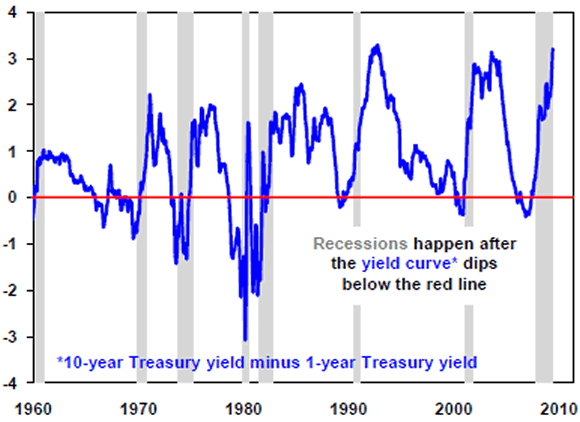The Recession Is Most Certainly Over
Economics / Economic Recovery Feb 26, 2010 - 01:44 AM GMTBy: DailyWealth
 Dr. Steve Sjuggerud writes: "There are still no jobs here," my friend Lee tells me.
Dr. Steve Sjuggerud writes: "There are still no jobs here," my friend Lee tells me.
Lee used to work for a beachfront resort on Florida's east coast. Our town was built on tourism and real estate. Both are dead. The resort is on the brink of bankruptcy.
I told you Lee's story a few months ago in DailyWealth. The situation isn't any better today. I lent him some money recently... which I know I might not see again.
Officially, Florida's unemployment rate is 12%. But unofficially, it has to be much worse... When 20% of Palm Beach County residents are 90 days or more behind on their mortgage (as I wrote about in DailyWealth here), something is going terribly wrong.
With all this terrible news in Florida, what I'm about to say might sound crazy to you. But I believe it is true: The recession is most certainly over. In fact, the more likely scenario is a boom.
Let me show you why with one simple indicator...
The indicator is the "yield curve." And it's saying there's definitely no risk of recession now.
The "yield curve" is a simple idea. A "normal" yield curve simply shows that if you want to borrow money for a year, the interest rate is lower than if you want to borrow money for 10 years. That's "normal" because it's riskier to lend someone money for 10 years than one year... so you demand a higher rate of interest for a 10-year loan.
Normally, the difference between long-term interest rates and short-term interest rates is about one percentage point. That's what it's averaged over the last 50 years. So when interest rates on 10-year government bonds are at 4%, as they are now, then interest rates on one-year bonds should be 3%.
So that's normal. But when the government – the Federal Reserve, actually – tries to steer the economy, it makes a mess of "normal." And when it does, recessions ALWAYS follow.
For example, if the Fed wanted to slow the economy down today, it would raise short-term interest rates over 4%. That would upset the natural order of things. It would make it expensive and difficult for banks and businesses to make money. It would lead to recession.
The chart on this page shows it... when the blue line drops below zero, it means the Federal Reserve raised short-term interest rates above long-term interest rates.
In every single instance in the last 50 years (except for one in 1966), a recession follows. (Economic growth fell to zero in the second quarter of 1967, so a stealth recession happened in that case as well.)

|
When you think about it, you could say the Federal Reserve actually causes recessions, by forcing short-term interest rates to a painfully high level.
That's what it did in 2006/2007. The yield curve was "inverted." Short-term interest rates were above long-term rates. And then the Great Recession hit.
Now the Federal Reserve is doing the opposite... It has cut short-term interest rates to artificially low levels again. The "yield spread" is now as wide as it's been at any time in the last 50 years, as the chart shows.
It is the recipe for another boom. The Fed is artificially creating a boom. That boom, of course, will end when the Fed raises rates too high someday down the road, and the cycle begins again.
So the Fed artificially pushing interest rates too high is our signal a recession is coming. We're definitely not there yet. According to this indicator, the bigger risk going forward is a great boom, rather than a "double-dip" recession like many are calling for.
Times feel really tough out there. I know it. I live on the coast of Florida, Ground Zero of the housing bust and the subsequent economic bust.
But I strongly believe the worst is over. One reason is the yield curve. This indicator has a fantastic track record. It's saying we're not headed into another "dip." It's saying there's a boom ahead.
Good investing,
Steve
The DailyWealth Investment Philosophy: In a nutshell, my investment philosophy is this: Buy things of extraordinary value at a time when nobody else wants them. Then sell when people are willing to pay any price. You see, at DailyWealth, we believe most investors take way too much risk. Our mission is to show you how to avoid risky investments, and how to avoid what the average investor is doing. I believe that you can make a lot of money – and do it safely – by simply doing the opposite of what is most popular.
Customer Service: 1-888-261-2693 – Copyright 2010 Stansberry & Associates Investment Research. All Rights Reserved. Protected by copyright laws of the United States and international treaties. This e-letter may only be used pursuant to the subscription agreement and any reproduction, copying, or redistribution (electronic or otherwise, including on the world wide web), in whole or in part, is strictly prohibited without the express written permission of Stansberry & Associates Investment Research, LLC. 1217 Saint Paul Street, Baltimore MD 21202
Disclaimer: The above is a matter of opinion provided for general information purposes only and is not intended as investment advice. Information and analysis above are derived from sources and utilising methods believed to be reliable, but we cannot accept responsibility for any losses you may incur as a result of this analysis. Individuals should consult with their personal financial advisors.
Daily Wealth Archive |
© 2005-2022 http://www.MarketOracle.co.uk - The Market Oracle is a FREE Daily Financial Markets Analysis & Forecasting online publication.



